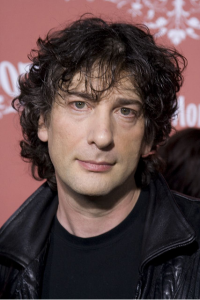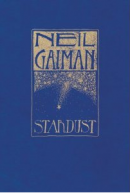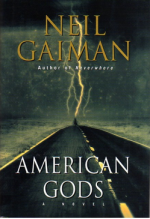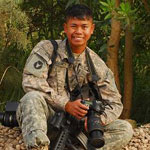Theme Essay by J.p. Lawrence
What Happens When a Fan Interviews His Hero?
This story begins deep in the bowels of a theater. I am being led through the labyrinth—through twists and turns, past catwalks and backdoors and tunnels—to the stage.
 There, Neil Gaiman waits.
There, Neil Gaiman waits.
The novelist, children’s book writer, comic book writer, amateur musician, and painter sits on a folding chair upon the stage. I sit on the chair opposite him. A public relations man for Bard College sits in another chair behind me.
The theater is empty, just we three, but a crowd is imminent.
I have only a few minutes to speak before the lights go on. My reporter face is hard, but inside I am quaky. Neil Gaiman, after all, is a hero of mine, but right now my goal is for him not to know that.
I ask him what brings him to this theater at Bard, in upstate New York.
He responds with kind-hearted and creaky warmth, a sentimental storytelling tone well suited for fairy tales. His voice meanders from the beginning of each sentence to its end.
He tells me he is in town with his wife, musician Amanda Palmer, who had a gig at the theater during the week. Tonight, he’ll be reading a short story he recently wrote about Sleeping Beauty. The story hasn’t even been read aloud as a bedroom soliloquy, but soon it will be introduced to a theater filled with hundreds of easily bored college students.
“So you have, like, a live sounding board now?” I venture.
“That’s honestly what I mostly want,” he says. He tells me that he brought along a notebook in addition to his story, so he can make notes and corrections as he reads.
Ballsy.
I think of the courage needed to read one’s rough draft out loud. I picture Neil Gaiman up on stage, pausing, pen in hand, as he divines the zeitgeist and rewrites his story.
In contrast, I am terrified at my own small performance. “Not Looking Stupid While Talking to Neil Gaiman,” a play in three parts, it’s called.
Gaiman finishes his answer, and I pause. A thread lost. A minor panic ensues. I search for the prepared questions on my notepad.
I ask: “What aspects of other genres have helped you create this story?”
 He glides into a response. It’s a story about Snow White, but everything is switched around a bit, and Snow White is the hero.
He glides into a response. It’s a story about Snow White, but everything is switched around a bit, and Snow White is the hero.
“I did her a bad turn once, so I did her a better turn here,” he says, and he sounds like the author of Stardust.
I ask him how one can actually create something original.
“You don’t,” he says. “I don’t think I’ve ever created anything original. What happens is that you grow up surrounded by stories, surrounded by images and songs and poems and performances and films and all of this stuff. And it all goes in.”
The interview delves into the abstract; no longer a recitation, it becomes a conversation. I’ve watched quite a few interviews of his. At some point, the social theatrics go away, and Neil Gaiman becomes a fawning nerd-geek fanboy, a reader of polyglots such as Harlan Ellison and Michael Moorcock and Charles Dickens.
“It all goes in,” he says, “and at some age, it all kind of melts down in your head. It composts. Like rotting fruit on a compost heap. And then you take that compost, and you plant your own seeds in it, and they grow new flowers. And the flowers that grow are being fed on everything that’s gone before.”
Gaiman sounds satisfied with his analogy, and I marvel at the liberties his British/American accent (“Trans-Atlantic,” as he calls it) takes with the word “composts.” His words seem aware of their own wisdom, as if he’s giving a commencement speech.
At this point, the public relations man is no longer scanning for signs of trouble. I am no longer asking questions from my notebook. Gaiman begins dispensing stories of upchucking.
“I did this once about a year ago in Edinburgh,” he says. “I hadn’t even typed a story; I had finished handwriting it about five minutes before the taxi arrived to take us to the gig. And I got onstage and read it in handwriting. And I was so absolutely terrified that shortly before I got on stage, I stuck my head out the window and threw up. Just from terror.”
 Cue an appropriate amount of laughter on my end.
Cue an appropriate amount of laughter on my end.
I feel like I have breached a barrier.
At the end of the interview, I pick up my voice recorder. I talk to him about his home near Minneapolis, as he calls for a mic check. “When I talk about home, I brag about you, Prince, Bob Dylan, and the Replacements,” I say.
“Oh yes, can’t forget about the Replacements,” he says, and he sounds like a man besieged by yet another fan. Like a man about to go up before a crowd and read his rough draft.
I bid him farewell.
As I walk away, I think of his response to my final question. He said: “You know, when you’re a college student, at that period of your life, my main advice would be to absorb everything you can. Read everything you can. Read outside of your comfort zone. Don’t obsess about writing. Don’t obsess about finishing stuff. Just absorb all your influences. And then start writing. And then start telling your stories. And sooner or later you’ll be telling the stories that only you can tell.”
And I realize that the interview was a routine performance, after all. I didn’t really break through to the private Neil Gaiman. For him, the true audience is still to come, the wolves to be found there—not with me, the eager fan.
Later, I watch him on stage as another admirer among many. And he sounds like a man born to tell fairy tales.
Art Information
- Photo of Neil Gaiman © pinguino; Creative Commons license

J.p. Lawrence is a veteran of Operation Iraqi Freedom. He served in southern Iraq from 2009 to 2010 as a military journalist with the 34th Red Bull Infantry Division. His deployment consisted of traveling to a strange new place, meeting strange new people, and gaining an understanding. He wrote more than 100 pieces there. Currently, he continues his Army career in between studying creative writing and anthropology at Bard College.
“Since I lost my childhood wonder of flying, I’ve thought that an airplane is like getting stuck in an elevator with 300 other people, where everyone is just waiting to be somewhere else. In the end we are just statistical noise, a few DNA patterns away from the chicken in an in-flight meal.” — Jetlag: A Love Story
